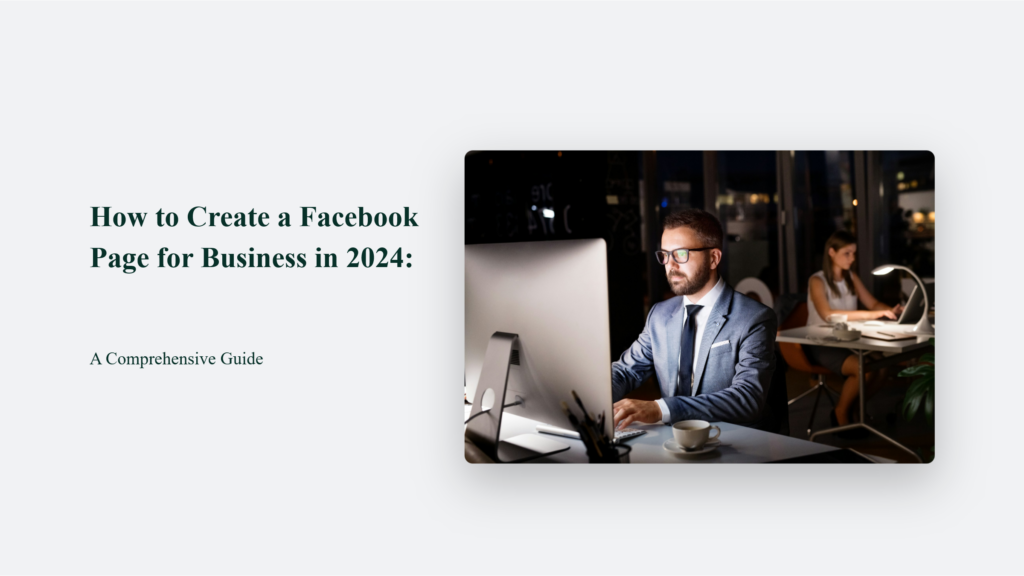

How to Create a Facebook Page for Business in 2024

As Seen On
In today’s digital age, having an online presence is crucial for businesses of all sizes. With over 2.9 billion monthly active users, Facebook remains one of the most popular social media platforms, making it an ideal platform for businesses to connect with their target audience. Creating a Facebook page for your business can help you build brand awareness, engage with customers, and drive sales.
This comprehensive guide will walk you through how to create a Facebook page for business.

The Importance of a Facebook Page for Your Business
Before we dive into the nitty-gritty of creating a Facebook page, let’s explore why it’s essential for your business. Imagine you’re a small business owner in Australia selling handcrafted jewellery. Without a Facebook page, you’re missing out on a vast pool of potential customers who spend hours scrolling through their newsfeeds.
A well-crafted Facebook page can showcase your products, share your brand story, and engage with your audience in a way that traditional advertising simply can’t match.
How to Create a Facebook Page for Business:
Step 1: Set Up Your Facebook Business Page
The first step in creating a Facebook page for your business is to set it up correctly. Here’s how:
- Go to facebook.com/pages/create and click “Get Started.”
- Select the appropriate category for your business (e.g., Local Business, Brand, or Product).
- Enter your business name, address, and contact information.
- Upload a profile picture and cover photo that accurately represents your brand.
Tip: Choose visually appealing, high-quality images that align with your brand’s aesthetic. Your profile picture should be a recognizable logo or image, while your cover photo can showcase your products or services.
Step 2: Optimize Your Facebook Page for Search Engines
While Facebook is a social media platform, optimizing your page for search engines can significantly improve its visibility and reach. Here are some tips for SEO-optimizing your Facebook page:
- Use Keywords in Your Page Name and Description: Incorporate relevant keywords that your target audience might use to search for businesses like yours. For example, if you’re a jewellery business in Sydney, you could include “handcrafted jewellery Sydney” in your page name or description.
- Add Relevant Categories and Keywords: Facebook allows you to add categories and keywords to your page, which can help users find your business more easily. Choose categories and keywords that accurately describe your products or services.
- Encourage Reviews and Ratings: Positive reviews and ratings can improve your page’s visibility in search results. Encourage satisfied customers to leave reviews on your Facebook page.
Tip: Use a content calendar to plan and schedule your posts in advance. It will help you maintain a consistent posting schedule and ensure your content is diverse and engaging.
Step 3: Create Engaging Content
A Facebook page without engaging content is like a beautifully wrapped gift with nothing inside. You must consistently create and share valuable content to keep your audience interested and returning for more. Here are some content ideas to get you started:
Behind-the-Scenes Glimpses: Share photos or videos that give your audience a look at your business operations, such as the creation process of your products or a day in your team’s life.
- Educational Content: Create informative posts, videos, or infographics that educate your audience about your industry, products, or services. For example, if you’re a jewellery business, you could share tips on caring for different types of gemstones or the meaning behind various jewellery designs.
- User-Generated Content: Encourage your customers to share photos or videos of themselves using or wearing your products. This not only creates a sense of community, but it also provides social proof and can inspire others to make a purchase.
- Promotions and Giveaways: Who doesn’t love a good deal or the chance to win something? Run promotions or giveaways to incentivize engagement and attract new followers.
Tip: Use a content calendar to plan and schedule your posts in advance. This will help you maintain a consistent posting schedule and ensure that your content is diverse and engaging.
Step 4: Leverage Facebook Ads
While organic reach on Facebook can be challenging, the platform’s advertising capabilities are second to none. Facebook Ads allow you to target specific demographics, interests, and behaviours, ensuring your message reaches the right audience. Here are a few ways to leverage Facebook Ads for your business:
- Boost High-Performing Posts: If you have a post performing particularly well organically, consider boosting it with a small ad budget to increase its reach and visibility.
- Run Conversion Campaigns: If your goal is to drive sales or generate leads, run conversion campaigns that direct users to your website or landing page.
- Retarget Website Visitors: Use Facebook’s retargeting capabilities to show ads to people who have previously visited your website but didn’t purchase. It can help nudge them towards conversion.
- Promote Special Offers or Events: Use Facebook Ads to promote limited-time offers, sales, or upcoming events to your target audience.
Tip: Start with a small ad budget and continuously test and optimize your campaigns based on performance data. Facebook’s ad platform provides detailed analytics that can help you refine your targeting and messaging for better results.
Statistics and Data:
- According to a recent survey by Hootsuite, 73% of marketers believe their efforts on Facebook are successful for their business.
- A study by Sprout Social revealed that businesses actively engaging with their audience on Facebook experience a 20% increase in revenue.
- As of April 2023, Facebook had 2.989 billion monthly active users, making it the largest social media platform globally.
- In 2023, a staggering 98.3% of Facebook’s advertising revenue originated from mobile devices, highlighting the platform’s dominance in the mobile advertising space.
The Bottom Line:
By addressing these frequently asked questions, we hope to provide you with a comprehensive understanding of creating and managing a successful Facebook page for your business.
Frequently Asked Questions:
How often should I post on my Facebook page?
There’s no one-size-fits-all answer, as the ideal posting frequency can vary depending on your industry, audience, and content strategy. However, most experts recommend posting at least once or twice a day to maintain consistent visibility and engagement.
Can I create a Facebook page for my business without a personal profile?
No, you’ll need to have a personal Facebook profile to create and manage a business page. However, you can assign multiple admins to your page, so you don’t have to use your personal profile for all page activities.
How can I measure the success of my Facebook page?
Facebook provides a wealth of analytics and insights within the platform. You can track metrics such as page views, engagement rates, reach, and click-through rates to gauge the performance of your page and content.
Konger
Up until working with Casey, we had only had poor to mediocre experiences outsourcing work to agencies. Casey & the team at CJ&CO are the exception to the rule.
Communication was beyond great, his understanding of our vision was phenomenal, and instead of needing babysitting like the other agencies we worked with, he was not only completely dependable but also gave us sound suggestions on how to get better results, at the risk of us not needing him for the initial job we requested (absolute gem).
This has truly been the first time we worked with someone outside of our business that quickly grasped our vision, and that I could completely forget about and would still deliver above expectations.
I honestly can't wait to work in many more projects together!
Disclaimer
*The information this blog provides is for general informational purposes only and is not intended as financial or professional advice. The information may not reflect current developments and may be changed or updated without notice. Any opinions expressed on this blog are the author’s own and do not necessarily reflect the views of the author’s employer or any other organization. You should not act or rely on any information contained in this blog without first seeking the advice of a professional. No representation or warranty, express or implied, is made as to the accuracy or completeness of the information contained in this blog. The author and affiliated parties assume no liability for any errors or omissions.

